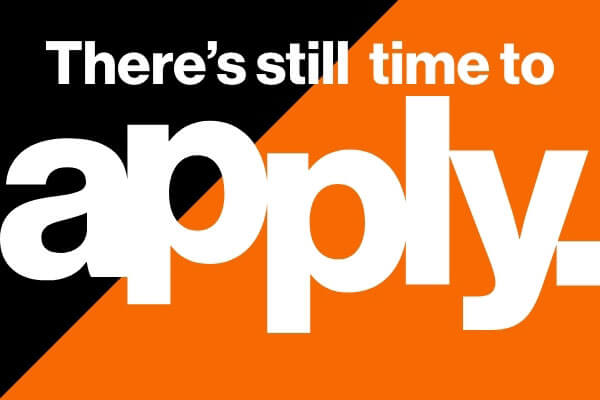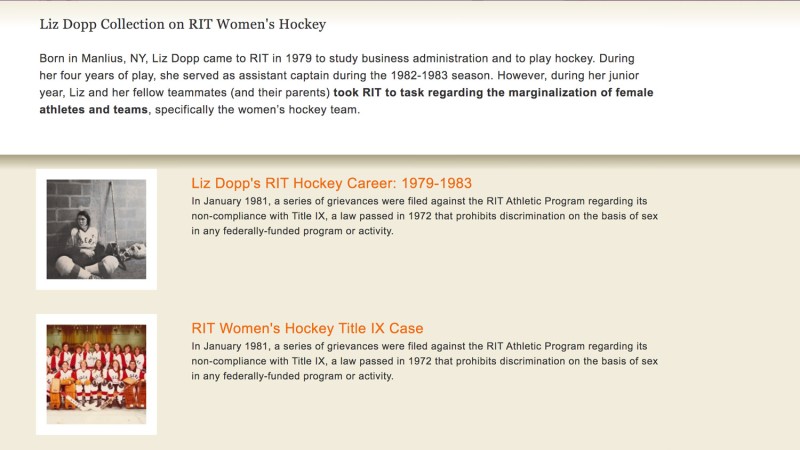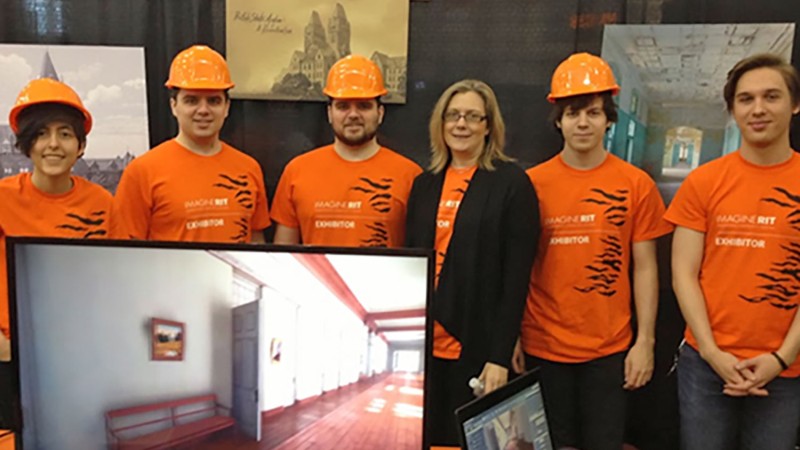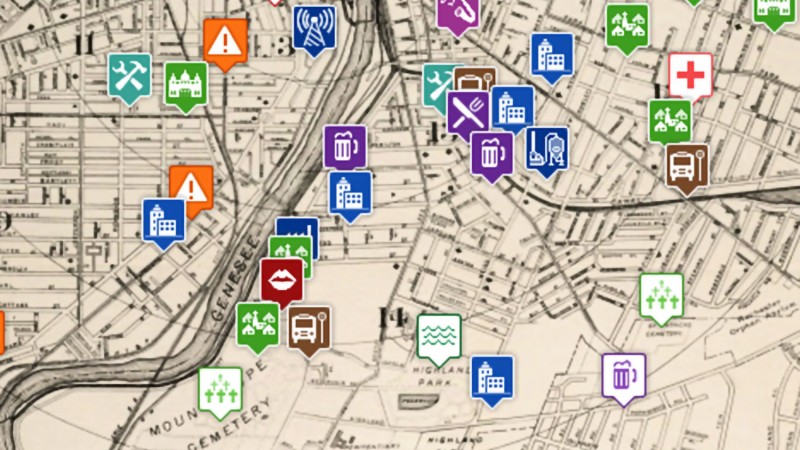Humanities, Computing, and Design Bachelor of Science Degree

Humanities, Computing, and Design
Bachelor of Science Degree
- RIT /
- Rochester Institute of Technology /
- Academics /
- Humanities, Computing, and Design BS
RIT’s humanities, computing, and design major pairs the liberal arts with tech to prepare you for a dynamic career that requires advanced computing and digital skills.
Overview for Humanities, Computing, and Design BS
Why Study Humanities, Computing and Design at RIT?
Multidisciplinary Approach: Humanities, computing, and design is an RIT New Economy Major. This collection of degree programs is forward-thinking and future-forming, and helps prepare you to excel in the multidisciplinary nature of our modern, dynamic economy.
Hands-On Experience: Develop a professional portfolio showcasing your work on dynamic, hands-on projects to employers.
Flexible Skill Set: Learn to collaborate effectively with all stakeholders on a project, navigate user needs, and anticipate technical possibilities and other skills used across various industries.
Teaching Partnership Program Available: 4+1 or 3+2 programs enable you to earn your bachelor’s degree at RIT and a master’s degree in education at one of our partner universities.
What is Humanities, Computing, and Design?
Humanities, computing, and design is a dynamic field of study that creates a bridge between the traditional liberal arts and the digital world, where critical thinking, cultural awareness, and communication integrate with digital technologies. A bachelor’s degree in humanities, computing, and design prepares you for emerging career opportunities that have resulted from professionals finding new and exciting ways to combine digital technologies and computing into everything from business and communications to education, history, museum studies, politics, public policy, and more.
Studying Humanities, Computing, and Design at RIT
RIT's bachelor of science in humanities, computing, and design pairs digital tools with computing to further a range of liberal arts fields, including anthropology, communication, culture, history, journalism, literature, and the arts. It creates new possibilities for these traditional fields by integrating digital technologies, computing skills, visual communication, data analytics, and more.
Career opportunities encompass endless ways to pair digital technologies with the liberal arts. For example:
- Journalists must have a strong foundation in social media and web content strategy as people turn to their digital devices to consume news and information.
- Advertising and marketing on social media are created using traditional market research to identify a target audience and advanced digital technologies to engage and track the behaviors of those users.
- Storytelling in games requires a writer to understand the function and gameplay of a particular interactive world as well as the creative writing skills to craft a captivating story.
- Visual communication (infographics, interactive content, motion graphics) must be dynamic, compelling, and effective as it’s used to present evidence in court cases, sell products in stores, and communicate instructions or directions.
- Museums and cultural institutions are creating new and exciting ways to integrate digital technologies to educate the public, engage visitors, and enhance the guest experience.
- Hotels, amusement parks, and resorts are turning to interactive apps that plan and manage guest experiences, wearables that unlock guest room doors and serve as your admission ticket, and a host of digital tools that enable online check-in, food ordering, and more.
RIT’s Degree in Humanities, Computing and Design
This major is uniquely interdisciplinary. You’ll pair course work in three of RIT’s colleges–College of Liberal Arts, Golisano College of Computing and Information Sciences, and College of Art and Design–to understand the historical and cultural contexts for, and to think critically about, how new technologies can impact traditional areas of the liberal arts.
Partnerships within RIT with the RIT Libraries, The Cary Graphic Arts Collection, and The RIT Press, as well as external relationships with The Library Company of Philadelphia and Malmö University in Sweden, provide distinctive opportunities for imagination and application.
As a student in the humanities, computing, and design major, you will learn to employ a range of tools and techniques, including:
- 3D design visualization
- Geospatial technology
- Electronic literature
The major also fosters critical analysis of digital culture, social media, and digital games. Team-based projects and public engagement are hallmarks of the program.
A Unique Pairing of Courses
The humanities, computing, and design major combines information science and technologies with the liberal arts to provide you with the integrative literacy increasingly necessary for careers in cultural institutions, government, educational institutions, and technology firms. You’ll take courses in:
- New media design
- Web and mobile design and development
- Database and data modeling
- Computing
Professional electives enable you to gain knowledge in areas you can apply directly to your professional pursuits, such as:
- Multi-platform journalism
- Digital design in communication
- Gaming and literature
- 2D animation and asset production
- Museums in the digital age
You’ll also gain broad knowledge as well as expertise in an area of specialization. A minor or immersion adds a secondary area of study.
Hands-On Experience to Gain Real-World Skills
In the humanities, computing, and design major, you will gain invaluable hands-on experience:
- A senior capstone project allows you to tackle a humanities computing problem and propose an innovative solution.
- At least one block of cooperative education and internship means full-time, paid career experience in industry.
- Team-based projects and lab courses.
- Study abroad or in an international co-op to enhance your understanding of global cultures.
Furthering Your Education in Humanities, Computing, and Design
Combined Accelerated Bachelor's/Master's Degrees
Today’s careers require advanced degrees grounded in real-world experience. RIT’s Combined Accelerated Bachelor’s/Master’s Degrees enable you to earn both a bachelor’s and a master’s degree in as little as five years of study, all while gaining the valuable hands-on experience that comes from co-ops, internships, research, study abroad, and more.
- +1 MBA: Students who enroll in a qualifying undergraduate degree have the opportunity to add an MBA to their bachelor’s degree after their first year of study, depending on their program. Learn how the +1 MBA can accelerate learning and position you for success.
RIT’s Teaching Partnership Programs
Whether your goal is to go into early childhood or elementary education, become a secondary education teacher with a content area specialty at the middle or high school level, or work in the higher education or counseling fields, RIT’s partnership programs with local universities provide a guided pathway to a career in teaching.
These 4+1 or 3+2 programs enable you to earn your bachelor’s degree at RIT and a master’s degree in education at one of our partner universities. As you progress, you’ll benefit from focused academic advising, career exploration opportunities, and resources for research, learning, and skill development.
RIT's humanities, computing, and design degree is eligible for RIT’s Teaching Partnership Program.
Learn more about RIT’s Teaching Partnership Programs.
-
Join us for Fall 2026
There's still time to apply. For some programs, applications will be reviewed on a rolling, space-available basis.
-
Join Us for Accepted Student Open House
Visit campus on March 28 or April 11 to meet faculty, tour campus, and ask your questions.
Careers and Experiential Learning
Typical Job Titles
| Analyst/Programmer | Database Manager | Digital Media Archivist |
| Information Technology Coordinator | Interactive Exhibit Curator | Marketing and Communications Supervisor |
| Project Manager | Software Engineer | Strategy and Marketing Rep |
| UI/UX Designer | Web Developer |
Industries
-
Electronic and Computer Hardware
-
Movies, TV, and Music
-
Government (Local, State, Federal)
-
Higher Education
-
Non-Profit
Cooperative Education
What’s different about an RIT education? It’s the career experience you gain by completing cooperative education and internships with top companies in every single industry. You’ll earn more than a degree. You’ll gain real-world career experience that sets you apart. It’s exposure–early and often–to a variety of professional work environments, career paths, and industries.
Co-ops and internships take your knowledge and turn it into know-how. A liberal arts co-op provides hands-on experience that enables you to apply your knowledge in professional settings while you make valuable connections between course work and real-world applications.
Students in the humanities, computing, and design major are required to complete at least one cooperative education or internship experience.
Creative Industry Days
Connect with Design Industry Leaders
RIT’s Office of Career Services and Cooperative Education hosts Creative Industry Days, which connects students majoring in art, design, film and animation, photography, and select computing majors with companies, organizations, creative agencies, design firms, and more. Creative Industry Days are a series of events that allow you to network with company representatives and interview directly for open co-op and full-time employment positions.
Featured Work and Profiles
-
RIT Grad to Lead Accessibility Engineering Innovations
Carter Sargent will join WW International as an accessibility engineer, focusing on creating inclusive digital experiences for users with disabilities, thanks to his specialized RIT training and co-op...
Read More about RIT Grad to Lead Accessibility Engineering Innovations -
VR Planetarium
During the fall term of 2020 and into the spring term of 2021, a four member team of capstone students conceived, designed, calculated and constructed a virtual reality planetarium: https:/...
Read More about VR Planetarium -
The Stories They Tell: Curating Online & Onsite Exhibitions
During Fall 2015, students enrolled in Professor Juilee Decker’s Cultural Informatics (MUSE 359) worked with RIT’s Archivist, Becky Simmons, and Associate Archivist, Jody Sidlauskas, to curate an...
Read More about The Stories They Tell: Curating Online & Onsite Exhibitions -
Buffalo State Insane Asylum: A Purposeful Recovery
The Project, Buffalo State insane Asylum: A Purposeful Recovery, was a year-long effort to render what is now called the Richardson Olmsted Complex in 3D design animation. Six students collaborated...
Read More about Buffalo State Insane Asylum: A Purposeful Recovery -
Friendship Album Project
Students in Tamar Carroll’s History of the Family in the U.S. course collaborated with the Library Company of Philadelphia to develop content for a web exhibit about the rare Friendship Albums in...
Read More about Friendship Album Project -
Steampunk Rochester
The Steampunk Rochester is an interdisciplinary project that brings students together to work on a large-scale narrative that is rooted in local history and spans the disciplines of Creative Writing,...
Read More about Steampunk Rochester
Curriculum for 2025-2026 for Humanities, Computing, and Design BS
Current Students: See Curriculum Requirements
Admissions and Financial Aid
First-Year Admission
First-year applicants are expected to demonstrate a strong academic background that includes:
- 4 years of English with a strong performance is expected.
- 3 years of social studies and/or history with a strong performance is expected.
- 3 years of math is required and must include algebra, geometry, and algebra 2/trigonometry.
- 2-3 years of science
Transfer Admission
Transfer applicants should meet these minimum degree-specific requirements:
- A minimum of precalculus is required. Calculus is preferred.
- Chemistry or physics is required.
- Computing courses are preferred.
Financial Aid and Scholarships
100% of all incoming first-year and transfer students receive aid.
RIT’s personalized and comprehensive financial aid program includes scholarships, grants, loans, and campus employment programs. When all these are put to work, your actual cost may be much lower than the published estimated cost of attendance.
Learn more about financial aid and scholarships
Accreditation
Related News
-
February 13, 2026
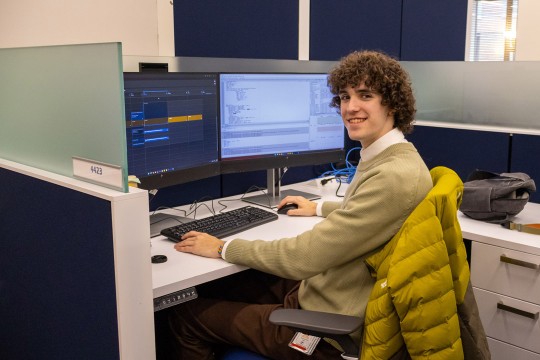
Student finds co-op success in the transportation industry
Before coming to RIT, Jacob Brodeur didn’t know what other opportunities were available to him in the urbanism industry. But the skills and experiential learning opportunities he gained by studying humanities, computing, and design offered a new path.
-
November 7, 2025

First-year Performing Arts Scholar lands major role in 'Macbeth'
After arriving on campus for the first time just a few weeks before their audition, Angel Ash landed a major role in Macbeth, showing in the SHED’s Sklarsky Glass Box Theater.
-
September 9, 2025

Winter, Spring, and Summer 2026 RIT Faculty-Led Study Abroad Programs
If you’re considering studying abroad, but aren’t quite sure how it will fit into your schedule, a Faculty-Led Study Abroad Program may be the perfect option. RIT’s College of Liberal Arts faculty are leading a fascinating range of courses during spring and summer 2026.
Contact
- Heather Roth
- Assistant Director of Recruitment and Retention Outreach
- Dean’s Office
- College of Liberal Arts
- 585‑475‑5456
- hmrgla@rit.edu










